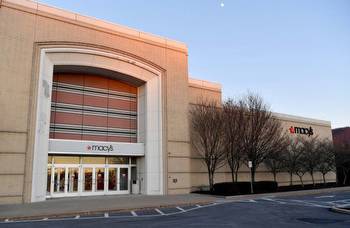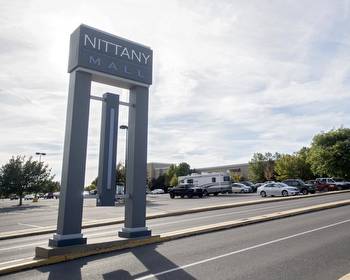Penn State Trustees Won't Take a Position on Nittany Mall Casino
Preliminary design rendering of the exterior of the proposed casino at the Nittany Mall. Image by Nelson Worldwide
While some community members have called on Penn State’s trustees to take an official position on the proposed Nittany Mall casino that has some worried about the impact of gambling on college students, the chair of the university’s governing board on Friday said it’s not their place to do so and they are not involved in the decision about whether it moves forward.
Chairman Matthew Schuyler said at the start of the board’s regular meeting that the trustees have received more than 200 public comments about the casino.
“Understanding the unique and important role the university plays in the local community, we appreciate that residents are voicing their diverse opinions on this topic,” Schuyler said. “The proposed casino is planned for a property in College Township, but it is otherwise not associated with Penn State University. Decisions regarding whether a casino can be opened are made by local municipalities and the Pennsylvania Gaming Control Board and there are mechanisms in place for individuals to share their opposition to or support of this private endeavor with these decision-making entities.”
The Category 4 casino — referred to as a mini-casino — would be located in the former Macy’s property at the mall in College Township, about 3 miles from the University Park campus. Investor and former Penn State trustee Ira Lubert had the winning bid of $10 million at a September 2020 auction to apply for a new casino license, with the bid indicating it would be developed in Centre County and the specific location later revealed as the 94,000-square-foot anchor spot at the mall.
Bally’s announced in 2021 it was partnering with Lubert on the $123 million casino project, which would have 750 slot machines, 30 table games and sports betting along with a restaurant and bar, entertainment venue and a multi-outlet quick-serve food and beverage area. The licensing process is still pending and a decision could potentially come as early as the Gaming Control Board’s November meeting.
“The Board of Trustees does not have a stance on this project nor does the board have the means to support or stop the development of a private, legal operation that has been approved by local and state officials,” Schuyler said. “The board remains focused on helping the university and its students continue with teaching, research, outreach missions and supporting the goals and safety of Penn State students, faculty and staff.”
While the proposed casino is unaffiliated with Penn State, it does have some ties to the university and its Board of Trustees. Lubert, a Penn State alumnus and benefactor, is the owner and president of SC Gaming OpCo, the entity formed to develop the casino. Richard Sokolov, a real estate executive and university donor who was elected as a trustee representing business and industry in July, is listed on the casino license application as one of SC Gaming OpCo’s three vice presidents, along with local developers Bob Poole and Ara Kervandjian.
Alumni-elected Trustee Alice Pope, meanwhile, expressed her personal opposition to the casino during a College Township Council meeting in early September that saw nearly two and a half hours of discussion and public comment about the project.
Pope, a retired professor of psychology at St. John’s University in New York, stressed that she was not speaking in her capacity as a trustee or on behalf of the board.
“The principles of psychology that guided my research and teaching throughout my career show that the best way to address problems is to prevent them in the first place,” Pope told the council. “I ask you to consider that this is not just another business. The human toll here, the costs are very real. It’s hard for me to understand how the community, the Penn State community, the surrounding communities, how this project is in the best interest of these communities.”
Opponents of the casino have voiced concerns about crime and impacts of gambling addiction, particularly given the proximity to Penn State and studies that show young adults are most susceptible to the negative impacts of gambling. They also questioned whether the township and Centre County would actually realize the economic benefit projected in a third-party impact study conducted for the casino developer as part of the licensing process.
Supporters have said that legal online options already make gambling widely available in Pennsylvania and that the region would experience an economic boost from a new entertainment venue. The impact study projected $1.6 million in tax revenue for College Township in the first year of operation and about 400 full time equivalent jobs
When Pennsylvania offered municipalities the opportunity to opt out from consideration as a casino host site in 2017, College Township was among a few in Centre County that chose not to do so, in part because a mini-casino could potentially provide a revitalization opportunity for the Nittany Mall. Council members also noted other nearby townships did not opt out and that they felt College Township was in the best position to manage the impacts of a casino.
After Lubert’s winning bid, the Gaming Control Board opened public comment in August 2021 and it continued until June 12. At an August 2021 public input hearing, the developers presented an overview of the plans, which were met with nearly unanimous support from those who spoke at the meeting.
In the year since the public hearing, opponents of the casino have been far more vocal in public forums than those who support it, inundating the township and Gaming Control Board with correspondence and sending myriad letters to the editors of local publications.
Among the letters to the township, many have asked for the council to pursue an opt out as a casino host or rescind September 2021 approval of a land development plan for exterior improvements to the former Macy’s property. Failing that, they want the township to inform the Gaming Control Board that because of community opposition the casino license should be denied.
Township solicitor Louis Glantz wrote in an opinion that under state law, the township’s opportunity to opt out expired in 2019 and that the council can’t arbitrarily deny a land development plan that conforms with township ordinances, nor can it rescind the conditional approval.
With public comment closed, a Gaming Control Board hearing officer in July scheduled an Aug. 26 deadline for petitions to intervene in opposition to the license and a tentative hearing date on the petitions of Oct. 19.
As expected, Cordish Companies, which operates as Stadium Casino in Pennsylvania, filed a petition to intervene. Cordish filed a still-pending lawsuit in Commonwealth Court in 2021, arguing that Lubert’s bid was improperly awarded and should be set aside.
A separate Gaming Control Board hearing to vote on license approval can only occur after the intervention arguments are settled.
Since their inception, the only Category 4 casino to be denied a license was in Beaver County, and that was because developers acknowledged they did not acquire the needed funding to move forward.
StateCollege.com Breaking News
Receive all the latest news and events right to your inbox.


























